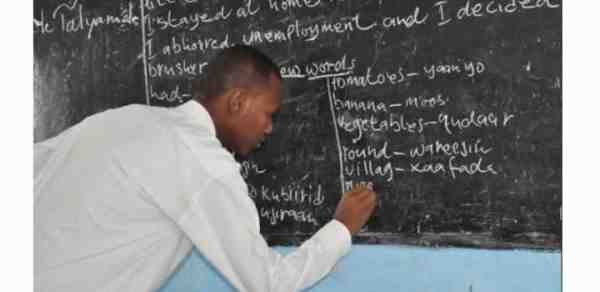Education
Private School Operators Deny Charging Exorbitant Fees, Hiring Unqualified Teachers

Some owners of private schools in the South-South region say they only charge school fees that are commensurate with the quality of service being offered.The private school owners made the expression during a News Agency of Nigeria (NAN) survey in Akwa Ibom, Cross River and Rivers.
Mr Godwin Okwu, the Chairman, National Association of Proprietors of Private Schools, (NAPPS), Cross River chapter, said that the fees charged by private school in the state were not exorbitant. Okwu further said that it was untrue that private schools employed unqualified teachers.“Whatever we charge as school fees is commensurate with the quality of service we provide.“Private schools may look expensive, this is because the government does not subsidise their services the way they do for public schools.“In some public schools, the government pays for everything including staff, and still collect fees from the students,” he said.He said it was wrong and unfair to compare the public school system to the private school system in terms of fees because public schools enjoyed the full support of government.“What we should consider is the quality of service and the product. It is not in doubt that the private school system is producing better results.“So it is unfair and contradictory to say that private schools employ substandard teachers, how then are we able to produce good results if our teachers are of low quality?” he said.The NAPPS chairman however said that private school owners were sometimes forced by economic realities to carry out minimal increase in fees.“Currently, the minimum wage for workers has increased, and private schools are expected to pay. How else do we raise the money to pay salaries?Okwu urged the state ministries of education to be more proactive and thorough in undertaking their inspectorate and monitoring functions.“As the regulator, the ministry should ensure uprightness. The interest of the children should be in the forefront,” he said.On his part, Mr Daniel Effiong, a Director of Inspection in Cross River Ministry of Education, said it was misleading to say that private schools employed low quality teachers.He said that the ministry had been resilient in monitoring the activities of private schools in the state.“We check the qualifications of the teachers, the environment, toilets among others before approval and upgrading.“This exercise is not just once, we do it regularly. Surely there are bad eggs in the system, we penalise them when they are uncovered,” he said.Also speaking on the issue, Mr Ubokmfon Williams, NAPPS Chairman in Akwa Ibom, said that private school owners in the state had not increased fees in a long time.Williams said that the economic situation in the country had made it difficult for private school owners to increase school fees.“With the way the economy is, any unnecessary increment in school fees may lead to massive withdrawal of students.“If you understand school business, if you truly want to remain in business, you have to avoid unnecessary increase in fees,” he said.The NAPPS chairman however said that sometimes, economic realities force private owners to increase fees in order to meet up.“Take salary as an example, if you don’t increase fees, how do you pay salaries of your workers. When you can’t pay salaries, your employees will go elsewhere.“As private school operators, we look critically at the interest of parents and the economic situation in the country before taking decisions.“We also want to remain in business, we are aware that the priority of every parent at the moment is food. We are very careful not to lose our market,” he said.Speaking on the reason private schools do not have uniform school fees, Williams said that criteria such as location and quality of service are considered by schools before fixing their fees.“Some schools pay for excursions, school bus, medicals, security, and some schools are located far away from town.“One thing is that no private school unilaterally fixes school fees, every private school liaises with its Parents Teacher Association before deciding what the fees will be,” he said.Speaking on the quality of services being offered by private schools, the NAPPS chairman, said that private schools did not treat the issue of teachers qualification with levity.“We hire not just good and professional teachers, we ensure that our teachers posses the skills to impart knowledge.“We are aware that a teacher may be a professional but may not skillful, so in the private school system, we are goal oriented,” he said.Mr Assam Abia, an Eket-based parent whose children are in private schools, said that more families took interest in sending their children and wards to private schools because the public school system failed at some point.“Parents are only seeing the fees charged by private schools as exorbitant because of the current economic challenges.“What I see is that school proprietors are responding to the basic economic law of demand and supply by increasing their fees,” he said.He said that the employment situation in the country had left many graduates without jobs, and that those who did not train to become teachers were now working as teachers.“Private schools are in business, they must make profits. The remedy lies in the monitoring agencies to do their jobs effectively.“The ministry or department that supervises private school should be more thorough and proactive, we want to see them in action,” he said.Abia also called for an overhaul of the education sector through legal and policy frameworks that would put the sector on the right track.“There is an urgent need for the Federal Government to declare a state of emergency in the education sector. Governments need to pay attention to the activities of private schools.In Rivers, a Legal Expert, Dr Hilda Desmond, blamed the fees being charged by private schools on the lack of supervision by regulatory authorities.Desmond, the Chairman, Nigerian Bar Association, Ahoada Chapter, said that poor regulation and supervision of private schools had negatively affected primary and secondary school education in the state.“The education sector has been grossly bastardized particularly by private operators. Private operators exploit parents without making efforts to step up operational standards.“What we call exorbitant fee is purely class driven. Some elite see high school fees as a sign of quality, and prefer to enroll their children in such schools.“It is a matter of choice, here are still schools with qualified teachers, affordable school fees and appreciable learning environment,” she said.The lawyer expressed concerns that some schools greedily converted child minders to classroom teachers and pay meagre salaries.She said that it was an act of wickedness for school operators to use poor quality teachers at the nursery and primary school levels.“Once there is a faulty nursery and primary education, the entire learning process of the child becomes ruined. So we must strive to get it right from the first stage.”Sadly, most private schools are in business, rather than employ qualified teachers that should impart knowledge, they compromise examination standards,” she said.Mr Isijana Adasi, a Port Harcourt-based Education Consultant, said that all tiers of government had failed to provide the atmosphere for quality education to thrive.Adasi, also the Lead Advisor, Adasi Science Project, identified inadequate budgetary provisions for education as a major reason for the inefficiency in supervision and monitoring of the private school system in the country.“This is part of the reasons that education inspectors have become vulnerable, and are now compromising standards.”Most school inspectors visit high profile schools with the mindset of receiving money and other packages without being thorough about their duties.“So, until regulatory authorities become committed to their duty of enforcing standards, the average Nigerian child may not get the best education, it does not matter how much parents pay as fees.Mr Isaiah Uwa, a Bori-based parent, urged the Federal Government to take more stringent steps towards improving the quality of service being offered by private schools.“Part of the efforts should also be to monitor what they charge as school fees. Quality and standard should be the primary consideration.“Some private schools claim to adopt British or American curriculum instead of the government approved curriculum. This shouldn’t be allowed.“Some of these schools make their pupils to skip classes and some statutory examinations, this is a gross disservice to the society,” he said.(NANEducation
How female Medicine Degree Holder Abandoned Certificate for Carpentry- Bugaje

The Executive Secretary, National Board for Technical Education (NBTE), Prof. Idris Bugaje has expressed the need to promote inclusivity, especially for women and persons with disabilities in technical education.
Bugaje stated this in Abuja while assessing the impact of President Bola Tinubu’s administration after two years in office.
He appealed for greater gender inclusivity in vocational and technical education, stressing that deliberate policies such as scholarships and incentives could help bridge the gender gap.
In support of his position, Bugaje shared an inspiring story of a female medical doctor who abandoned her medical career to pursue carpentry.
“There is a story I want to share with you, about a girl who was interested in becoming a carpenter.
“The father was a carpenter and they were four children in the family, three boys and herself.
“Whenever she joined the boys to the workshop, the father would send her away, saying, `you are a girl, go back to the house, you are not supposed to be a carpenter’’.
“Without giving considerations to the passion of the young girl, the father sent her to a medical school.
“She graduated with the MBBS, went and did the one-year internship after graduation, and chose a role as a medical doctor.
“After that, she came back to the father, returned the MBBS certificate to him, and thanked him.
“Afterward, she told the father that her passion is in carpentry, not to practice as medical doctor,” Bugaje narrated
He added that after spending seven years on medical training, the father had no option but to send her to Turkey to learn how to make furniture.
Addressing cultural and societal barriers often faced by young women in technical fields, Bugaje appealed to parents to support their daughters’ interests in trades like plumbing, electrical installation, and carpentry.
He also called on policymakers to prioritise passion and skill development among youth, especially girls, noting that such encouragement could lead to greater innovation and self-reliance.
“If they want to become carpenters, ICT experts, or POP artists, allow them.
“In skills’ training, passion is very important. That’s what motivates children and helps them innovate.
“We need to harness these innovations if the country is to move forward and rise beyond being a third-world nation,” he said.
He emphasized the need to have deliberate policies to encourage women to come into TVET through scholarships and other incentives. (NAN)
Education
WAEC Apologies for Conducting English Exam Late, Cites Leakage Prevention

The West African Examinations Council (WAEC) has apologized for delay in conducting English Language Paper 2 in the ongoing 2025 West African Senior School Certificate Examination (WASSCE).
The took place on Wednesday evening.
In a statement by Moyosola Adesina, Acting Head of Public Affairs Department of
WAEC, the council said that it encountered challenges.
”While maintaining the integrity and security of our examination, we faced considerable challenges primarily due to our major aim of preventing leakage of any paper.
“We recognise the importance of timely conduct of examinations and the impact of this decision on candidates, their schools and parents, and we sincerely apologise for any inconveniences caused,” WAEC stated.
It said that it successfully achieved its objective but it inadvertently impacted the timeliness and seamless conduct of the examination.
“In spite of our best efforts, we encountered logistical hurdles, security concerns and socio-cultural factors that negatively influenced our operations,” WAEC said.
The council re-affirmed its commitment to upholding the highest standard in examination conduct, and pledged to continue to promote academic excellence. (NAN)
Education
FG vows full WAEC CBT shift by 2026 – Minister

The Minister of Education, Dr Tunji Alausa, has reaffirmed the Federal Government’s commitment to fully transitioning to Computer-Based Test (CBT) examinations for the West African Examinations Council (WAEC) and other exam bodies by 2026.
Dr Alausa made this known while monitoring the conduct of WAEC’s CBT examinations in Abuja on Wednesday.
He expressed optimism about Nigeria’s capacity to modernise its examination system and reduce widespread malpractice through digital innovation.
Commending WAEC’s initiative, the minister described the shift from traditional pen-and-paper exams to CBT as a historic and crucial step toward fairness and educational integrity.
“We are working very hard to eliminate fraud in our exam system, and WAEC is taking the lead,” he said.
Highlighting the advantages of CBT, Alausa noted that the system simplified the exam process while significantly curbing cheating.
“We now have clear evidence that when exams are done using technology, the level of fraud is minimised to almost zero,” he stated.
He further lauded WAEC’s internal safeguards, explaining that the CBT system was operated via a secured Local Area Network (LAN), making it “literally impossible” to hack.
According to the minister, by Nov. 2025, all WAEC multiple-choice exams will be conducted using CBT.
He added that essay questions and NECO examinations would follow suit by 2026.
On infrastructure and logistics, particularly in remote areas, Alausa acknowledged the challenges but assured that scalable solutions are in progress.
“Are we going to be ready to provide every single needed infrastructure by November? Absolutely not.
“But as we move into the future, we will be ready. We have to challenge ourselves as government,” he said.
He also addressed concerns over the logistics of conducting multiple exams.
“In WAEC, the average student takes about eight to nine papers.
“They do it over several days. Those are the logistics we, as administrators, have to work through, and we already are,” he explained.
The ongoing WAEC exams, which began on April 24, are scheduled to conclude on June 20, 2025.
A total of 1,973,253 candidates from 23,554 schools are participating. Of this number, 979,228 candidates are male, accounting for 49.63 per cent, while 994,025 candidates are female, making up 50.37 per cent.(NAN)



















